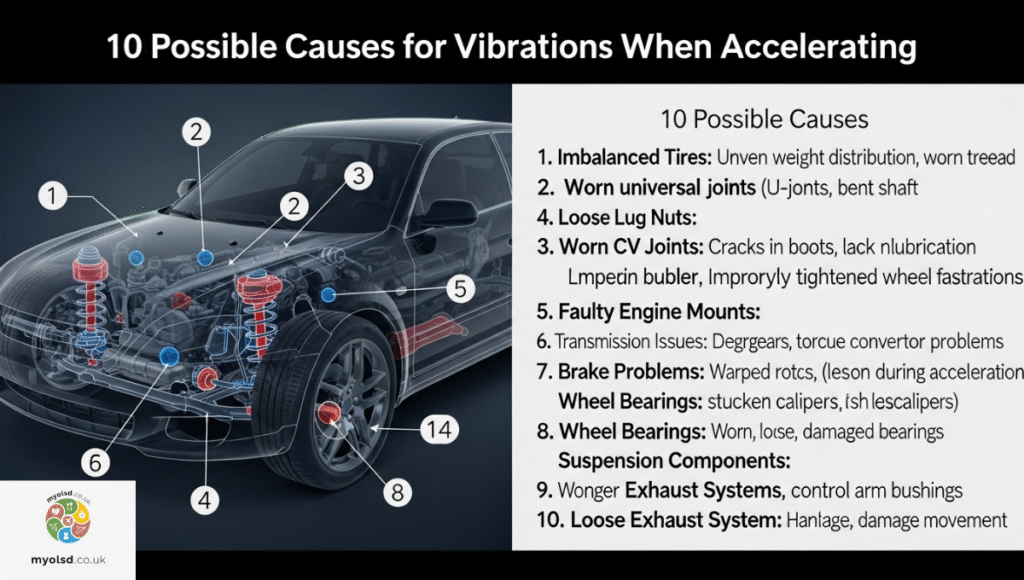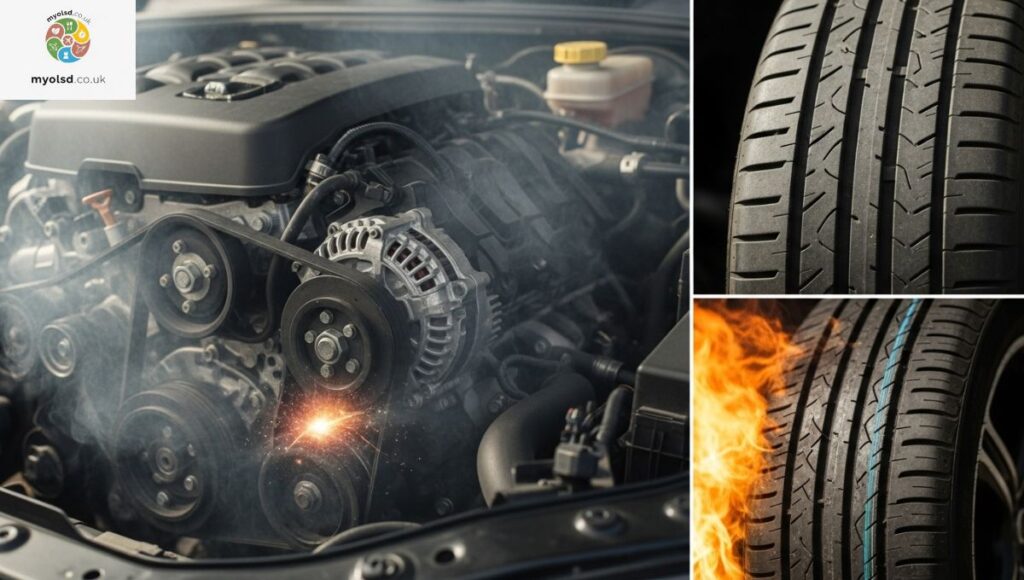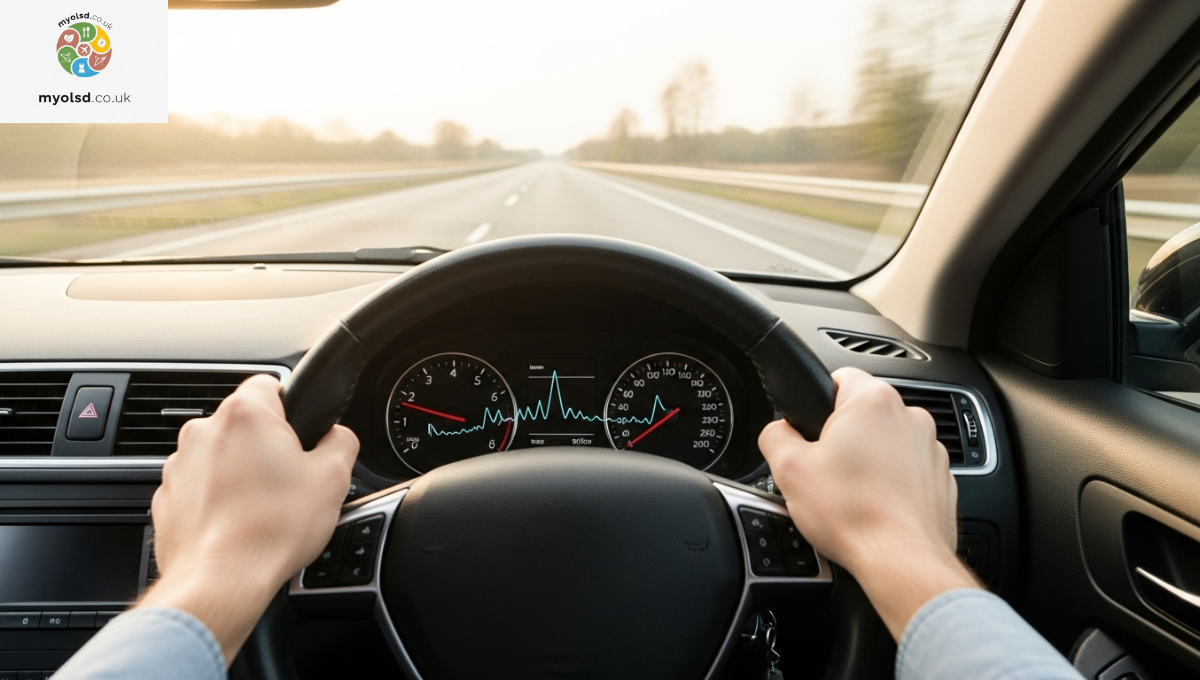Have you ever been driving and suddenly felt your car start to shake when you press the gas pedal? It’s unnerving, frustrating, and honestly makes you wonder if something serious is wrong. You might be thinking, Why does my car shake when I accelerate? and you’re not alone. Many drivers notice this issue and feel unsure about what’s causing it or how dangerous it might be.
In this blog post, we’ll break down the most common reasons why your car shakes during acceleration and explain how you can identify the problem. From tires and wheels to engine and transmission issues, you’ll get clear, easy-to-understand insights that help you take action. By the end, you’ll know what to check, what to fix, and how to keep your ride smooth and safe.
Car Shakes & Shudders When Accelerating [Here’s Why]
When your car vibrates while you press the accelerator, it can stem from multiple components working incorrectly. Engines misfiring, worn spark plugs, and unbalanced tires are frequent culprits. Sometimes, it’s as simple as a loose lug nut; other times, more serious problems like a bent axle or failing CV joint are to blame.
Even minor issues can become expensive if ignored. Shaking can affect engine performance, steering stability, and braking efficiency, making it both a safety and a maintenance concern. Understanding the root cause is essential to avoid more costly repairs in the future.
10 Possible Causes for Vibrations When Accelerating

Worn-Out Spark Plugs
Spark plugs ignite the air-fuel mixture in your engine cylinders. When they’re dirty, worn, or improperly gapped, your engine may misfire, producing a noticeable shake during acceleration. Replacing spark plugs is generally inexpensive but dramatically improves performance and smooths out vibrations.
Unbalanced Tires
Tires that aren’t balanced distribute weight unevenly around the wheel, causing noticeable shaking, especially at certain speeds. A professional tire balancing service restores proper weight distribution, reducing vibrations and extending tire life.
Stuck Brake Calipers
A brake caliper that doesn’t fully release can drag on your wheels. This friction causes resistance, which you feel as shaking when accelerating. Cleaning, lubricating, or replacing the caliper usually resolves this issue.
A Bent Axle or Driveshaft
Hitting a pothole or curb can bend your axle or driveshaft. Even a slight bend produces significant vibrations during acceleration. Unfortunately, bent axles usually need replacement, as driving on them can cause further damage.
A Worn CV Joint
CV joints transfer engine power to the wheels while accommodating suspension movement. When worn, the joints cause vibrations, especially during acceleration or turning. Replacing CV joints, while costly, restores smooth operation.
A Bent Wheel
A wheel that’s bent from impact can prevent proper contact with the road. This irregularity leads to shaking that resonates through the steering wheel. Replacement or professional straightening is required for safety and comfort.
Old or Damaged Tires
Worn or damaged tires, including bubbles or tread separation, can cause severe vibration. Regular inspections can prevent these issues, but replacement is often the only solution when damage is visible.
Loose Wheel Nuts
Loose lug nuts reduce wheel stability and may even cause wheels to detach. This is extremely dangerous. Ensuring all nuts are tightened to the correct torque specification eliminates this risk.
Bad Motor Mounts
Motor mounts secure your engine to the chassis and absorb vibrations. When they fail, the engine’s movement causes noticeable shakes, especially during acceleration. Replacing worn mounts is crucial for smooth operation and prevents further engine or transmission stress.
Transmission Issues
Low transmission fluid or internal damage can produce a shudder when accelerating. Diagnosing transmission problems is complex and usually requires professional service, but early intervention prevents extensive damage and costly repairs.
Read more Article: Why Disohozid Are Bad
Is it Safe to Drive if Your Car is Shaking?

Driving a car that shakes when accelerating is risky. While minor vibrations might not seem dangerous, they can indicate more serious underlying issues. Worn tires, bent axles, or failing motor mounts can worsen over time, potentially leading to loss of control.
If you notice shaking, it’s safest to schedule a professional inspection immediately. Mechanics can pinpoint the root cause, recommend repairs, and ensure your vehicle is safe for the road. Addressing the issue early often saves money, time, and potential accidents.
Ask The Professionals at Paul’s Auto Repair
Your car’s safety and performance are paramount. At Paul’s Auto Repair, our expert technicians offer thorough inspections to identify and repair the causes of shaking during acceleration. From tire balancing and CV joint replacement to transmission service, we ensure your car runs smoothly.
Don’t wait for a small vibration to become a bigger problem. Professional diagnosis and timely repair not only restore comfort but also safeguard your vehicle’s longevity and your safety on the road.
Car Shaking When Idling? Here’s Why [Idle Car Shaking]
Sometimes, your car shakes even when it’s not moving. Common reasons include engine misfires, faulty spark plugs, or worn motor mounts. Addressing these problems early prevents shaking from escalating during acceleration and reduces wear on other components.
Car Slow to Start When Cold? Car Starting Rough in Cold Weather: Here’s Why
Cold weather affects engine performance. Thickened fluids, sluggish battery output, or spark plug issues can lead to rough starts and vibrations. Routine maintenance, including battery checks and spark plug replacement, keeps your car running smoothly even in winter.
My Car Smells Like Burning Rubber: Why Car Smell Like Burnt Rubber

A burning smell often accompanies mechanical problems that can cause shaking. Stuck brake calipers, slipping belts, or overheating components are common culprits. Identifying the source quickly prevents further damage and keeps your car safe.
Conclusion
A car that shakes when accelerating isn’t just a nuisance; it’s a warning. From unbalanced tires and worn spark plugs to bent axles and failing CV joints, the root causes vary widely. Regular maintenance, timely inspections, and professional repairs are key to a smooth, safe ride. By understanding the potential issues, you can take control of your vehicle’s health, prevent costly repairs, and ensure safe driving for years to come.
FAQS
Why does my car vibrate when accelerating at low speeds?
Low-speed vibrations are often caused by unbalanced tires, worn spark plugs, or issues with the engine mounts. Checking these components usually helps identify the problem.
My car shakes when I accelerate, but stops once I let off the gas. Why?
This usually indicates engine misfires, a faulty CV joint, or transmission issues. The shaking stops when the engine load is reduced.
Why does my car shake when accelerating at 40 mph?
Shaking around 40 mph can be caused by unbalanced tires, bent wheels, or a misaligned suspension system. Inspecting these parts often solves the issue.
Why does my car shake when I accelerate at high speeds?
High-speed shaking is commonly linked to bent axles, worn driveshafts, or loose wheel nuts. Professional inspection is recommended for safety.
Why does my car shake when I accelerate, and the check engine light comes on?
This usually indicates engine misfires, faulty spark plugs, or ignition system problems. A diagnostic scan will pinpoint the exact cause.
Why does my car shake when I accelerate over 60 mph?
Vibrations over 60 mph often result from unbalanced tires, misaligned wheels, or worn suspension components. Balancing or alignment typically resolves it.
Why does my car shake when I accelerate over 70 mph?
At very high speeds, issues like bent axles, loose lug nuts, or damaged driveshafts can cause shaking. Immediate inspection is crucial for safety.
Why does my car shake when I accelerate, then stop?
Shaking that stops after acceleration can be due to engine load, misfiring cylinders, or worn motor mounts. Identifying the faulty part is key to fixing it.


1 thought on “Car Shakes When Accelerating?”